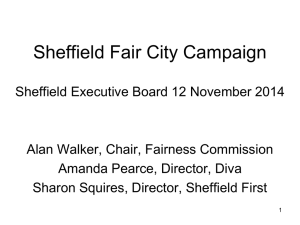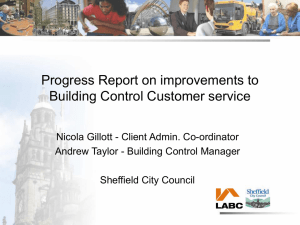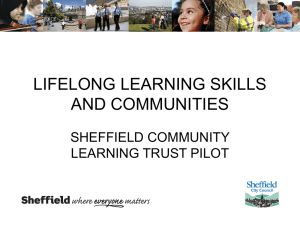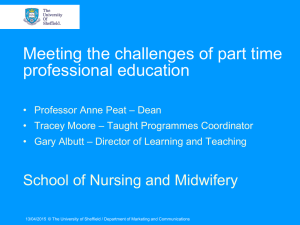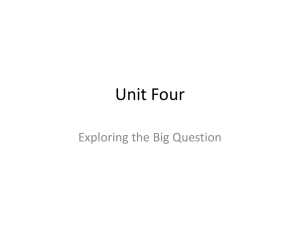available for here – 1.2MB ppt
advertisement
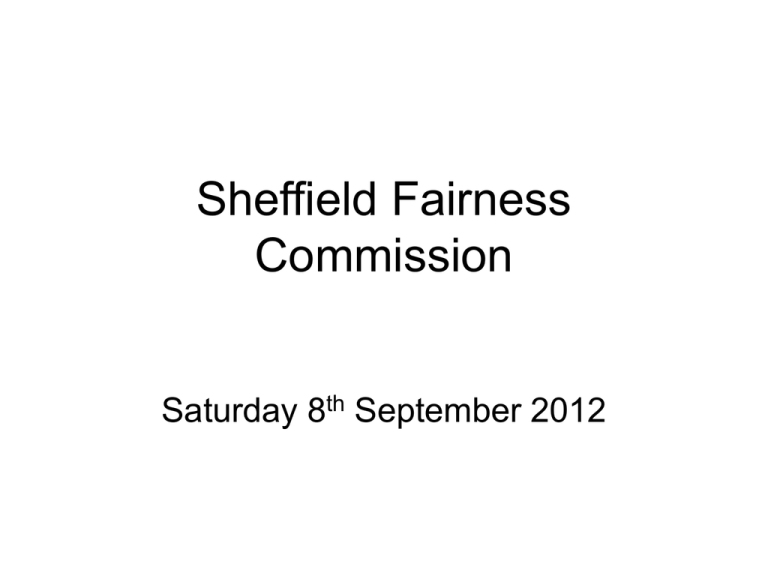
Sheffield Fairness Commission Saturday 8th September 2012 Agenda 10.00 Welcome – Cllr Julie Dore 10.05 Fairness in Sheffield – Prof Alan Walker 10.30 Workshops 12.15 Coffee and feedback 12.30 Closing comments – Prof Alan Walker Welcome Cllr Julie Dore Leader Sheffield City Council Fairness in Sheffield Professor Alan Walker Chair of the Fairness Commission Source: Deprivation in Sheffield Report Dr A Rae Communities of Interest • Women working full time are paid, on average, 15.5% less an hour than men for doing work of equivalent value • The number of deaths caused by road traffic accidents made up around 5% of all those of 0-14 year olds and 19% of all 15-24 year olds in Sheffield • 12% of BME people feel unsafe when out in their local area during the day in comparison with only 4% of White British people • People with disabilities tend to have lower rates of employment, lower incomes and are more likely to be living in poverty • Only 36.4% in Sheffield of people with mental health problems or learning disabilities were in employment …Journey’s End In The North of The City. ...A Trip On Route 83 Firth Park Ward Life Expectancy Male: 75.88 Years Female: 79.47 Years East Ecclesfield Ward Life Expectancy Male: 78.57 Years Female: 81.41 Years Burngreave Ward Life Expectancy Male: 75.70 Years Female: 77.25 Years …On Through City Centre Streets Southey Ward Life Expectancy Male: 77.57 Years Female: 80.8 Years Broomhill Ward Life Expectancy Male: 77.58 Years Female: 78.29 Years Central Ward …Skirting Nether Edge Past Endcliffe Park Life Expectancy Male: 76.90 Years Female: 80.82 Years Overall Level of Multiple Deprivation (Rank Score By LSOA 2010) Nether Edge Ward …Our Journey Starts Here In Bents Green Ecclesall Ward Life Expectancy Male: 82.17 Years Female: 86.78 Years Life Expectancy Male: 80.84 Years Female: 82.53 Years Index of: • Life expectancy • Math & Literacy • Infant mortality • Homicides • Imprisonment • Teenage births • Trust • Obesity • Mental illness – incl. drug & alcohol addiction • Social mobility Index of health and social problems Health and social problems are worse in more unequal countries Wilkinson & Pickett, The Spirit Level www.equalitytrust.org.uk Fairness Commission Remit “… to make a non-partisan strategic assessment of the nature, extent, causes and impact of inequalities in the City and to make recommendations for tackling them.” How does it work? • • • • • • • • • • Independently chaired Commission Taken a ‘Select Committee’ approach Commenced with a call for evidence 6 public hearings ‘Satellite meetings’ Generate a big debate within Sheffield on inequalities and fairness Publish a final report and recommendations Reports to the Council and also considered by Sheffield Executive Board Continue the debate on fairness Monitor the impact What is Fairness? • Fairness is a matter of social justice: a society in which individuals and groups are treated fairly and receive a just share of its benefits and burdens. • This does not mean addressing inherent individual or biological differences between people, for example, in terms of gender or race. • Our focus is on those differences, inequalities, which arise from the way a society or city, is organised socially, politically and economically. A Bold Vision A city that is eventually free from damaging disparities in living conditions and life chances, a place in which every citizen and community knows and feels that they will be treated fairly. We aspire to be the fairest city in the country. Principles 1. Those in greatest need should take priority 2. Those with the broadest shoulders must contribute the most 3. The commitment to fairness must be a long-term one 4. The commitment to fairness must be citywide 5. Prevention is better than cure Principles (continued) 6. Be seen to act in a fair way as well as acting fairly 7. Civic responsibility 8. An open continuous campaign for fairness in the city 9. Fairness must be a matter of balance 10. The city’s commitment to fairness must be demonstrated and monitored Themes 1. Health inequalities – Inequity of health service resource allocation; Stronger focus on mental health 2. Poverty, welfare and benefits – Living wage; strengthen support to advice services 3. Employment and unemployment – Quality of jobs; encouraging entrepreneurship Themes (continued) 4. Aspiration, attainment and skills – Early years; schools more accessible for parents 5. Housing and environmental issues – Affordable homes; A Sheffield standard for housing and the environment 6. Crime – Rehabilitation to break cycles and patterns of offending 7. Access to services and transport – Flat fares for young people What Next? • Today’s event – your views and input • Commission continues to consider evidence and the output from today • Final report and recommendations • Implementation • The big debate Workshops Workshop Each group to use the pictures/words from magazines provided and/or to draw to provide a visual representation of: • • What would a fair city look like? What would an unfair city look like? Workshops (Continued) 2. Can you provide some specific examples of how Sheffield is fair or unfair? 3. Where is Sheffield on the spectrum of being a fair / unfair city? 4. What do you think the solutions/interventions to the issues identified in part 2 are? 5. Summary – 1 flip chart sheet only Closing Comments Prof Alan Walker University of Sheffield
